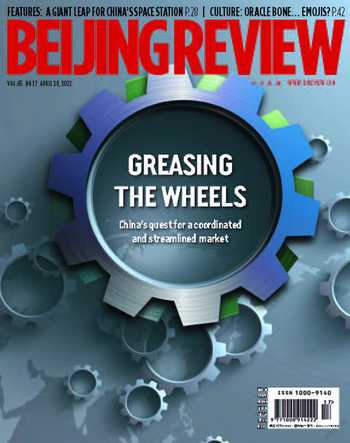THIS WEEK
DYNAMIC AND DRIVEN

President Xi Jinping delivers a keynote speech via video link during the opening ceremony of the Boao Forum for Asia Annual Conference 2022 on April 21.
The Chinese economy will provide great dynamism for the stability and recovery of the global economy and broader market opportunities for all countries, Xi said.
He said no matter how the world will change, China’s faith in and commitment to reform and opening up will not waver.
Field to Be Green
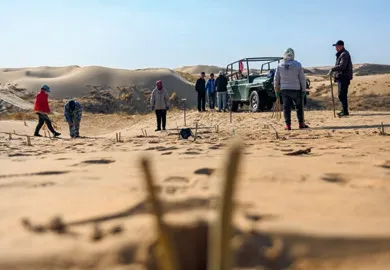
Workers plant trees at an eco-tourism area in Dalad Banner, Inner Mongolia Autonomous Region,on April 18.
Supportive Policies
Major cities in the Yangtze River Delta have rolled out a series of measures to alleviate the cash crunch faced by small and micro enterprises caused by the recent COVID-19 resurgence,Xinhua News Agency reported on April 18.
Fiscal policies such as tax and fee reductions, an extension of the deadline for filing tax returns, and rent concessions have been introduced for tens of thousands of private enterprises and individual entrepreneurs.
The policies are clear-cut in terms of measures concerning finance, logistics and information to support the recovery of the retail industry, and involve responsible government departments for the convenience of enterprises, said Ding Zuohong,Chairman of the board of directors of Yuexing Group in Shanghai.
Preliminary estimates show that tax-related measures taken by Shanghai could reduce the burden on related industries and enterprises by approximately 140 billion yuan ($22 billion) in 2022.
At least three major cities in the Yangtze River Delta—Shanghai, Hangzhou and Suzhou—have issued policies to facilitate financing guarantees,provide interest rate subsidies,and guide financial institutions to grant more loans for small and micro enterprises in an effort to alleviate financial strains.
Benefiting from targeted measures for the services industry, which has been severely impacted by the pandemic, sectors such as food and beverage,retail, tourism, transportation and exhibitions have seen an improving environment for financing.
Authorities in Zhejiang Province will provide free regular nucleic acid testing for employees of food and beverage business, and accept deferred payments of unemployment insurance premiums for eligible retail enterprises. Hangzhou, the provincial capital, will partially exempt public transportation service providers from valueadded tax.
Shanghai has encouraged government-backed financing guarantee institutions to provide credit support for travel agencies,and it has been considering subsidies for the exhibitions industry.
A Task for Talent
Shenzhen, a technological powerhouse in Guangdong Province, saw 27,000 Chinese students return from overseas to settle down locally last year, an increase of over 30 percent year on year and marking a record high, according to the municipal human resources and social security bureau, Xinhua reported on April 13.
The city, home to a bevy of Chinese startups and tech heavyweights including Huawei and Tencent, is an attractive choice for job seekers because of its fast-developing industries such as software and information technology services, finance,education and manufacturing.The returned students who gained residency in Shenzhen in 2021 had graduated from universities in nearly 60 countries and regions around the world. The average age of the cohort is approximately 27, with over 95 percent aged under 35 and over 80 percent holding a master’s degree or higher.
Relics Protection
More than 1.1 million folios of 3,281 ancient books and documents have been archived at the Potala Palace in Tibet Autonomous Region over the past three years, Xinhua reported on April 18.
The progress was announced at a relics protection conference in the region, following completion of the first phase of a 10-year project that began in late 2018. The project aims to protect ancient texts at the palace and has a total investment of 300 million yuan($47 million).
The Potala Palace, located in the regional capital of Lhasa, was built by Tibetan King Songtsen Gampo in the seventh century and was expanded in the 17th century.
The palace was included on the UNESCO World Heritage List in 1994 and holds a collection of invaluable scriptures, historical documents, and precious relics,including statues, paintings and frescoes.
The palace collection includes tens of thousands of ancient books and documents in Chinese, Tibetan, Manchu,Mongolian and Sanskrit.
Grand Canal Refilled
The Grand Canal, a vast waterway connecting northern and southern China, is set to see all of its empty sections refilled with water this year as a water-supply project kicked off on April 14.
Launched by Beijing, Tianjin,Hebei and Shandong—four of the regions the canal flows through—it is estimated this project will inject 515 million cubic meters of water into the northern part of the canal, according to the Ministry of Water Resources.
The water will primarily come from some sections of the Southto-North Water Diversion Project,recycled water and accumulated rainwater, the Ministry said.
Once completed, this project is expected to increase the water surface area of the Grand Canal by 9.5 square km from a year earlier, the Ministry said, adding that this will help improve the ecosystems along the canal.
With a history spanning 2,500 years, the Grand Canal connects Beijing and Hangzhou in Zhejiang Province, and served as a significant transportation artery in ancient China. The longest and oldest artificial waterway in the world, the Grand Canal is a UNESCO World Heritage site.
Due to historical evolution,human activities and climate change, some sections of the canal began to dry up in the first half of the 20th century.
Fraud Crackdown
China’s top court has ordered a nationwide campaign to crack down on fraud against senior citizens, especially fraud related to aged care, Xinhua reported on April 18.
The Supreme People’s Court(SPC) said that courts nationwide should more severely punish criminals committing these crimes.
The SPC also asked courts to take all possible measures to retrieve the proceeds of these crimes and to minimize victims’ losses.
The top court added that more publicity efforts are needed to raise awareness of the tricks commonly used by these criminals.
Afforestation Drive
China Forestry Group Corporation said on April 16 that it will strive to plant 40,267 hectares of trees in the country in 2022.
The company, the only centrally administered stateowned forestry enterprise , raked in 1.28 billion yuan ($200 million)in profits in 2020, up 64.7 percent from the previous year.
China planted 3.6 million hectares of forest and converted 380,800 hectares of farmland into forest in 2021, and took targeted measures to improve the quality of forests, restoring 933,300 hectares of degraded forest over the same period.
Back in Business
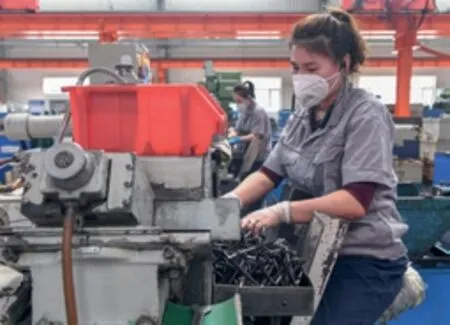
An employee at an auto parts factory in Jilin City, Jilin Province, on April 19. Local enterprises have been resuming production under strict COVID-19 prevention and control measures.
Stocking Up

Employees at a farm in Chongming District, Shanghai, transfer packaged vegetables to be sent to urban areas on April 19.Vegetable production and processing enterprises in the district have been making efforts to assure the vegetable supply to urban areas amid the recent COVID-19 resurgence in the metropolis.
New Legislation
A law on futures and derivatives was adopted at a session of the Standing Committee of the National People’s Congress,China’s top legislature, on April 20. It will take effect on August 1.
Financial institutions should obtain approvals, fulfill traders’duties of suitability management and observe relevant regulations when conducting derivatives trading, according to the new legislation.
The law also clarifies rules on swap and forward contracts.
Overseas institutions should obtain approvals from futures regulatory authorities under the State Council before engaging in futures marketing, promotion and solicitation activities in China, it stipulates.
China’s futures market posted record-setting trading volume and turnover in 2021,which stood at 581.2 trillion yuan($90.8 trillion) and over 7.5 billion lots, respectively,data from the China Futures Association showed.
NEV Support
Measures will be rolled out to bolster the new-energy vehicle(NEV) industry, including extending the preferential policy for purchase tax, the Ministry of Industry and Information Technology said on April 19.
The country will continue to pilot new NEV battery-swapping models amid efforts to stabilize the industrial and supply chains,Luo Junjie, an official with the Ministry, told a press conference.
China’s NEV sector is likely to maintain a rapid pace of expansion in 2022, according to Luo.
Nevertheless, it also faces challenges such as COVID-19 flare-ups, price hikes in raw materials, and auto chip shortages.
To help NEV manufacturers address these challenges,the Ministry will formulate a roadmap for the low-carbon development of the auto industry,encourage the integration of auto electrification and intelligent technologies, and improve the safety of NEV batteries and their adaptation to low temperatures, according to Luo.
It will also speed up the domestic exploitation of NEVrelated resources and cooperate with other authorities in cracking down on hoarding and price gouging to bring raw material prices “back to a reasonable level,” Luo added.
In the first three months of this year, China’s retail sales and output of NEVs amounted to roughly 1.26 million units and 1.29 million units, respectively,both seeing a 140-percent surge from a year earlier, data from the Ministry showed.
Tax Refunds
Value-added tax (VAT) credit refunds topped 420.2 billion yuan ($65.9 billion) in the first half of April, data from the State Taxation Administration showed on April 19.
The refunds benefited 527,000 taxpayers, according to the administration.
Tax refunds and cuts are expected to total 2.5 trillion yuan($390.7 billion) nationwide this year, while VAT credit refunds will account for 1.5 trillion yuan($234.4 billion) of the sum and will all go straight to enterprises,according to this year’s government work report.
R&D Spending
Centrally administered stateowned enterprises (SOEs)increased their spending on research and development (R&D)to boost innovation-driven development in the first three months of 2022, according to the State-Owned Assets Supervision and Administration Commission of the State Council on April 19.Their total investment expanded 18.9 percent year on year to 151.42 billion yuan ($23.76 billion), the commission said.
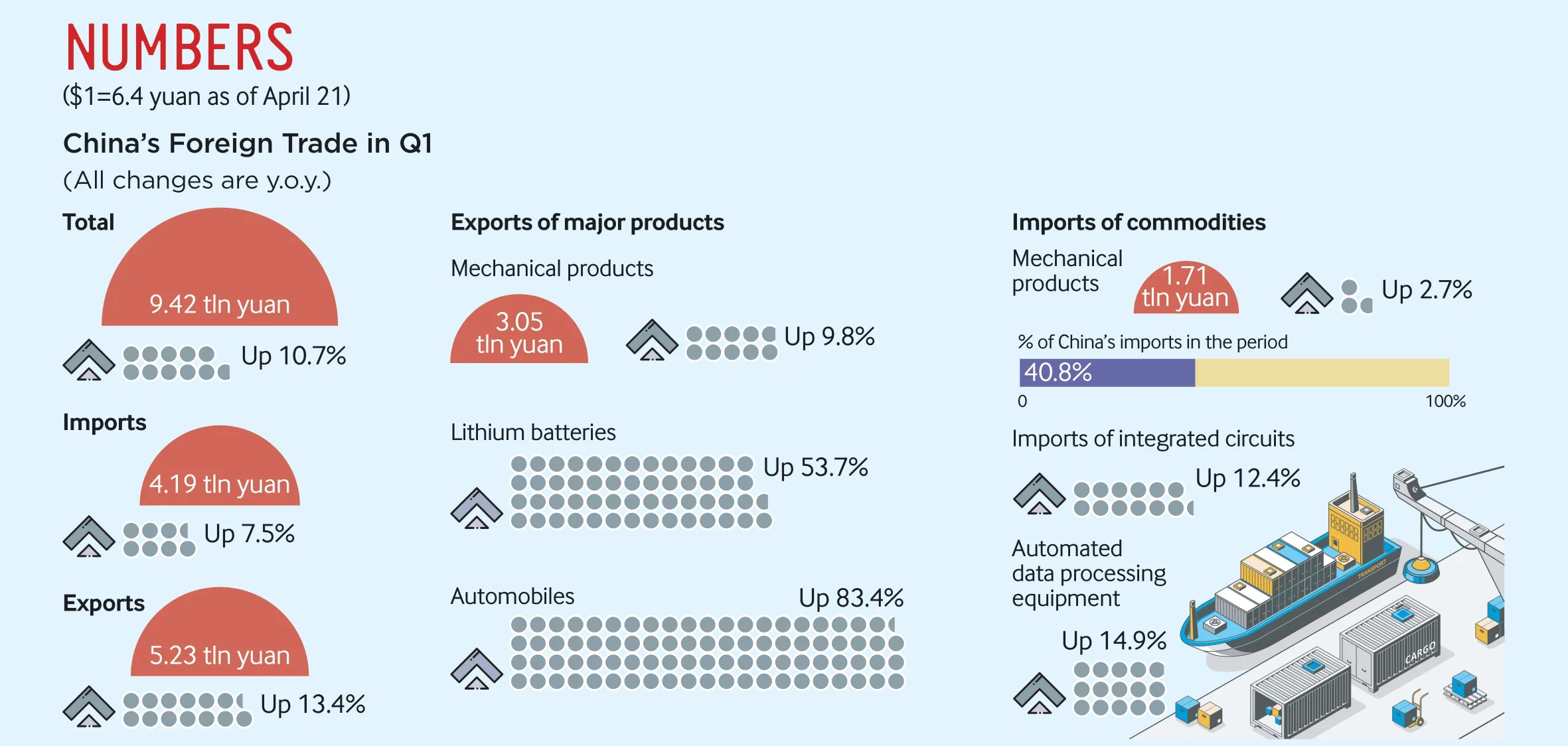
The operating profit margin of central SOEs stood at 6.8 percent during the months, flat with the same period last year.
The data also showed that production efficiency of the companies increased steadily.Their annualized total labor productivity was 727,000 yuan($113,630) per capita in the first three months, a year-on-year increase of 13 percent.
In the first quarter, the companies raked in 9 trillion yuan ($1.4 trillion) in combined revenues, up 15.4 percent year on year. Their net profits grew 13.7 percent to 472.33 billion yuan($73.8 billion).
Interbank Bonds
By late March, bonds in China’s interbank market held by overseas institutions reached 3.88 trillion yuan ($607.24 billion),according to a report released by the People’s Bank of China Shanghai Head Office.
The figure represented a drop of 110 billion yuan ($17.2 billion) month on month.
In March, nine new overseas institutional investors entered the market, bringing the total number to 1,034, the report showed.
Service Outsourcing
The service outsourcing industry posted a steady expansion during the January-March period, data from the Ministry of Commerce showed.
Chinese firms inked related contracts worth about 488.1 billion yuan ($75 billion), up 10.3 percent year on year.
The executed contract value came in at 318.5 billion yuan($49.8 billion), with a year-onyear increase of 17.2 percent.
Of the total, offshore service outsourcing contract value rose 4.6 percent from a year ago to 264.8 billion yuan ($41.4 billion).
Service outsourcing with members of the Regional Comprehensive Economic Partnership saw quicker growth,with the executed contract value rising 3.2 percent from a year earlier to 38.2 billion yuan ($5.9 billion).
Gas Pipeline
The China-Central Asia Gas Pipeline sent 10.07 billion cubic meters of natural gas to China in the first quarter of the year,according to PipeChina West Pipeline Co.
Last year, the pipeline’s annual transmission volume totaled about 44.1 billion cubic meters, the company said.
By late March, the pipeline had delivered about 390 billion cubic meters of natural gas to China since it was put into service in December 2009.
With a total length of 1,833 km and a designed annual capacity of 60 billion cubic meters, the project is China’s first transnational gas pipeline. It begins at the border between Turkmenistan and Uzbekistan,passes through Uzbekistan and Kazakhstan, and links up with China’s West-to-East Gas Pipeline in Horgas, Xinjiang Uygur Autonomous Region.
Nuclear Power Unit
A new nuclear power unit in Pakistan powered by a Chinadeveloped Hualong One reactor has started commercial operation, the China National Nuclear Corp. said on April 18.
Karachi Unit 3 is the fourth nuclear power unit worldwide use Hualong One technology, a third-generation reactor design.Karachi Unit 2 and Unit 3, both powered by Hualong One reactors, will provide nearly 20 billion kWh of electricity for Pakistan, the corporation said.
The project’s construction has also helped boost the local economy and related industries,it added.
Two nuclear power units using Hualong One reactors are operating in China.


UNITED STATES Giant panda cub Xiao Qi Ji (right)and its mother Mei Xiang enjoy an ice cake at the Smithsonian’s National Zoo in Washington, D.C.,on April 16, marking the 50th anniversary of the China-U.S. giant panda conservation program

IMF International Monetary Fund (IMF) Chief Economist Pierre-Olivier Gourinchas during a virtual press briefing in Washington, D.C., the U.S., on April 19.The organization’s World Economic Outlook report slashed the global growth forecast for 2022 to 3.6 percent amid the Russia-Ukraine conflict, 0.8 percentage point below the January projection
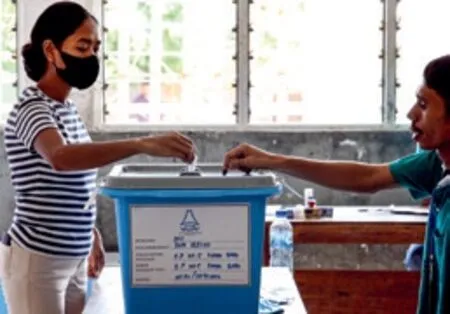
TIMOR-LESTE A woman casts her vote during the final round of the youngest Asian nation’s presidential election at a polling station in Dili on April 19

ZIMBABWE President Emmerson Mnangagwa lights the Independence Flame during Zimbabwe’s 42th Independence Day celebrations in Bulawayo on April 18

TURKEY People take pictures in front of tulips at a park in Istanbul on April 15
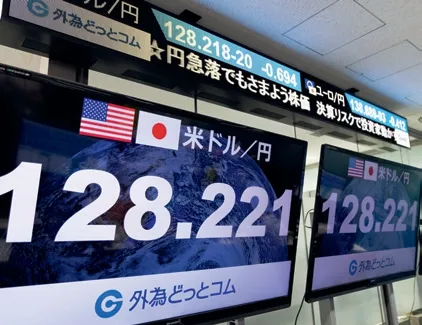
JAPAN Display shows the exchange rate between the Japanese yen and the U.S. dollar at a foreign exchange brokerage in Tokyo on April 20. The Nikkei’s index of the world’s leading currencies showed the yen declined by 5.7 percent in the frist quarter of 2022, second only to the Russian ruble, mainly due to major central banks in Europe and the U.S.shifting monetary policies
SHANGHAI OFFICIAL APOLOGIZES FOR COVID-19 DISRUPTIONS
Nucleic acid screening is one of the most important measures to quickly detect new COVID-19 cases, quarantine those who tested positive and effectively cut off the virus’ transmission routes, Shanghai Executive Vice Mayor Wu Qing said at a press briefing on April 19.
Wu apologized, saying that adjustments to the nucleic acid screening process had inconvenienced community workers and residents alike, and promised to improve screening quality and efficiency. The results of every testing round will provide further data support to dynamically modify prevention and control strategies in the next step, he added.
The executive vice mayor further stated over 37 million nucleic acid tests had been administered as of April 15, with the city’s maximum daily testing capacity reaching 5 million tubes.

Supermarket aisles today brim with appealing packaging targeting the younger appetite. These foodstuffs claiming to be “additive-free” or “helping children grow” are sold at much higher prices than “regular” groceries.And many parents will go the extra financial mile to get their offspring the finest nutrition possible.
But China as of yet features no classification system to separate, register and grade adult and kid foods,meaning there are no national laws,regulations or even just standards in place to vouch for food differentiation.This reality strikes a stark contrast with the parental belief that their kids’meals underwent much stricter testing than their own.
Nutritional intake directly bears on a child’s overall wellbeing. The nation must first introduce strict standards before products targeting the youngest consumers can hit shelves and hold accountable those producers and vendors offering harmful foods labeled as kidfriendly. Finally, then, parents should realize that paying a premium for a better diet may see their children end up paying a much higher price: their health.
“The U.S. is in no position to point fingers at other countries’ human rights conditions. What the U.S.should do, is face up to its own serious human rights problems, and reflect on how to address the root causes of the deteriorating human rights situation.”
Wang Wenbin, spokesperson for China’s Foreign Ministry, at a regular briefing on April 18
“When we celebrate the Chinese language, we also celebrate its contribution to cultural diversity,intercultural dialogue, and lasting peace.”
Santiago Mourao, President of the 41st UNESCO General Conference, pointing out that Chinese is the most ancient script still in use during the celebration of the 2022 United Nations Chinese Language Day on April 20

Rich in cultural heritage, Shaanxi Province in northwest China must not only protect its historic treasures, but reinvigorate them and create value in the process of their inheritance.
Ready to take on the massive task, the province has decided to combine cultural relic preservation with the improvement of local living conditions by presenting its indigenous customs and unique cultures to the outside world and up its appeal as a tourist destination. For example,age-old terraces today intertwine with village farm life, demonstrating traditional ways of planting rice across a simply stunning scenery.
During peak season, villagers put down their farming tools and become cooks and waiters in the agritainment business; some even stage entire local culture shows for tourists.
Last but not least, the provincial capital of Xi’an is now home to 158 museums, one for every 82,500 people—much higher than the national average. The area’s history is very much alive in modern times.The Flexi FlockApril 18
Some 200 million Chinese people today opt for flexible work arrangements, a type of employment playing a crucial role in ensuring the people’s livelihood and social stability.
Flexible employment is no newcomer to the occupational scene, but the rapid rise of the digital economy has lifted it to the next level. New technologies have created numerous newfangled jobs and lowered the threshold for employment.Teleworking and mobile undertakings have provided employees with the opportunity to adapt their time and place of work to their individual needs. People nowadays can enjoy more flexibility in their working hours and methods than before.
Nevertheless, flexible employment remains a more unstable form of employment—possibly here today, gone tomorrow. This work model still requires standardization to help its labor force improve competitiveness to better manage career ups and downs and keep China’s job market stable.
NEW DEPUTY HEAD OF NPC CONSTITUTION AND LAW COMMITTEE
Ying Yong was appointed deputy head of the Constitution and Law Committee of the 13th National People’s Congress on April 20.
Ying served as secretary of the Hubei Provincial Committee of the Communist Party of China (CPC) from February 2020 to March this year. He first rose to prominence in 2003 in Zhejiang Province as president of the provincial higher people’s court. He then served as head of the Organization Department of the CPC Shanghai Municipal Committee before becoming deputy party secretary of Shanghai. He assumed the post of mayor of Shanghai in January 2017. In February 2020, Ying was appointed secretary of the CPC Hubei Provincial Committee, at a time when the central Chinese area was hit hard by the outbreak of COVID-19.
Born in 1957 in Xianju, Zhejiang, Ying went on to work for several government organizations in the province since 1976.

“My concern is that we may experience what happened in the UK,where they drastically pulled back restrictions and subsequently saw a significant surge [in new COVID-19 cases].”
Saskia Popescu, an infectious disease epidemiologist and assistant professor at George Mason University, the U.S., in a recent interview with
“Earth is facing a triple planetary crisis. Climate disruption. Nature and biodiversity loss. Pollution and waste. This triple crisis is threatening the wellbeing and survival of millions of people around the world.”
UN Secretary General António Guterres,in his message for World Earth Day,which falls on April 22

